Ecuador at critical crossroads in push for abortion rights
In the largely conservative nation, women can be sentenced to up to two years in prison for having an abortion.
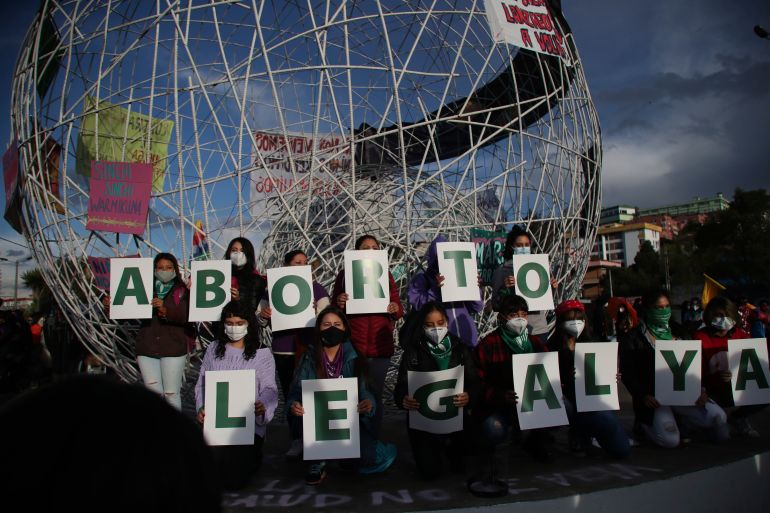
Ana Cristina Vera could tell countless stories of women she has helped extricate from the jaws of Ecuador’s severe anti-abortion laws, but the lawyer and feminist organiser always starts with one: Carla’s.
In 2014, on her way to work in the city of Esmeraldes, Carla – a name Vera, her lawyer, uses to protect her identity – fell down a set of stairs. She picked herself up, only to later discover that she was bleeding. She assumed it was her period, which was two weeks late, and got medication from a friend for the pain, Vera told Al Jazeera.
Keep reading
list of 3 itemsBanker Lasso wins surprise victory in Ecuador election
Ecuador’s president-elect Lasso promises ‘better days are coming’
But days later, when Carla went to a hospital still in pain and with a fever, a doctor called the police upon hearing what had happened. “She told them she didn’t even know she was pregnant, but the police kept pressuring her and pressuring her,” said Vera.
Carla was eventually imprisoned, accused of taking misoprostol, a drug used to induce a medical abortion. She was charged with an abortion and spent four months in pretrial custody until Surkuna, a feminist collective in Ecuador that provides legal aid to women, found out about her case and sought her release.
The charge was eventually thrown out due to lack of evidence, said Vera. “This is the constant: women who are poor, who are looking for help, and who come up against a health and judicial system that is completely machista (“male chauvinist”) and discriminatory,” said Vera, who is also executive director of Surkuna.
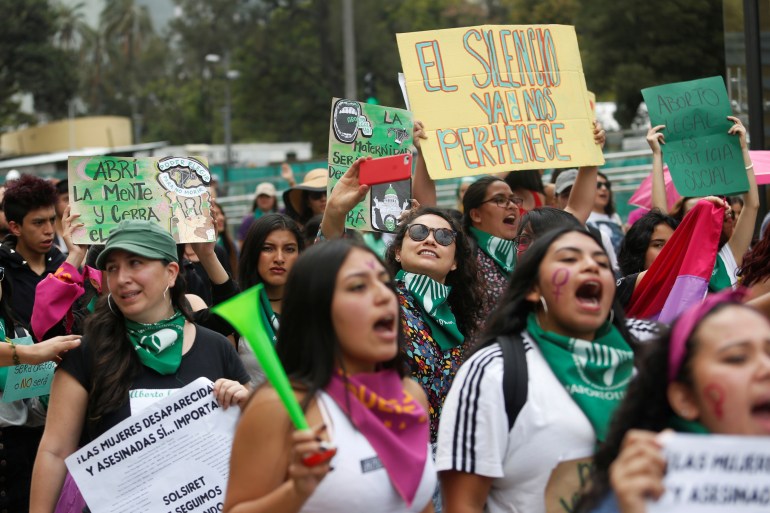
Ban on abortion
Carla’s story mirrors many contained in a report released last week by Human Rights Watch (HRW) that exposes the effect of Ecuador’s abortion ban, one of the harshest in Latin America.
“The criminalisation of abortion has a devastating impact on the lives and health of women and girls,” said Ximena Casas, Americas researcher for HRW and author of the report.
As has been seen in many other countries where abortion is illegal, outlawing the termination of a pregnancy does not stop it from occurring, said Casas. Rather, it makes it more dangerous, primarily for women who are low income and live in rural regions.
In Ecuador, the procedure is only permitted in cases where the life or health of the mother is at risk or if the pregnancy is the result of rape. The latter exemption came after the Constitutional Court in April decriminalised abortion in all instances of rape, a decision that was heralded as historic in a country where seven girls under the age of 14 become mothers every day, according to HRW.
But a woman found guilty of an illegal abortion still could be sentenced to six months to two years in jail in Ecuador, a conservative and predominantly Catholic country. A medical professional who carried out the abortion faces a jail term of up to three years.
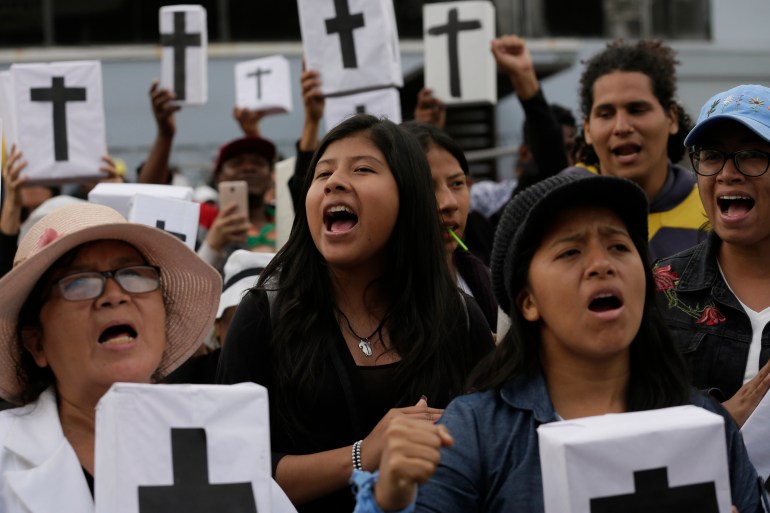
Dozens of cases
HRW reviewed 148 abortion-related court cases in Ecuador between 2009 to 2019 and found that the vast majority – 81 percent – were prosecutions of women. The women prosecuted were overwhelmingly young, overwhelmingly poor, and disproportionately Indigenous or of Afro descent. Almost two-thirds were between the ages of 18 and 24. Some 12 percent were girls under the age of 18.
Sixty cases involving 70 defendants resulted in guilty verdicts, while 38 people went to jail. Others received suspended sentences, which included time volunteering in orphanages or programmes designed to teach them how to be “good mothers”. In 73 percent of the cases, the prosecutions started after doctors reported the women to police, something HRW noted violates their duty to confidentiality.
The report also includes several personal stories, including that of Gladis, an Indigenous woman who injected “perroffin” – a poison used to kill stray animals – into her abdomen to end an unwanted pregnancy. She served two months in jail, HRW reported.
Or that of Fernanda, a 15-year-old girl who was raped, had an abortion and was then sentenced to three months of psychological therapy. “I’m the one who suffered, why do they want to make me suffer again,” she told her therapist.
“The law is being used as a moralising law, so that women and girls have a reproductive destiny that is not one they have chosen,” said Vera. “I had a case where they turned off the cameras [in court] and asked us why we were defending murderers.”
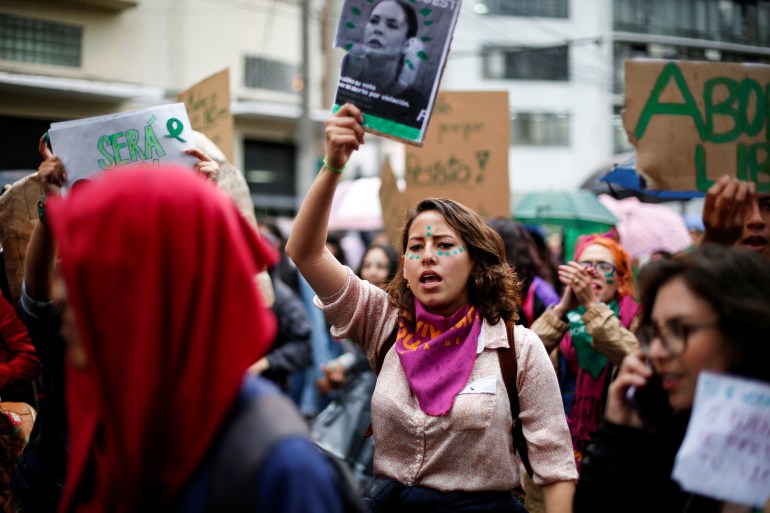
Critical juncture
The HRW report comes at a critical time for abortion rights in Ecuador.
In its April ruling, the Constitutional Court ordered the National Assembly to adopt legislation that ensures abortion access for rape survivors. On June 28, the Ombudsperson’s Office presented its bill, and the assembly now has six months to discuss and pass it.
Ecuadorian President Guillermo Lasso, a staunch Catholic, said in a statement that he respected the court’s decision and expected members of his government to do the same. HRW and other campaigners are seizing on the opportunity to push for greater reforms, and demanding abortion be legalised more broadly.
The struggle over abortion rights is happening across Latin America. In December, Argentina became the largest country in the region to legalise the procedure in all circumstances up until 14 weeks of pregnancy. Activists in countries such as Chile and Colombia are fighting to ease restrictions, while in Honduras legislators responded by hardening its complete prohibition.
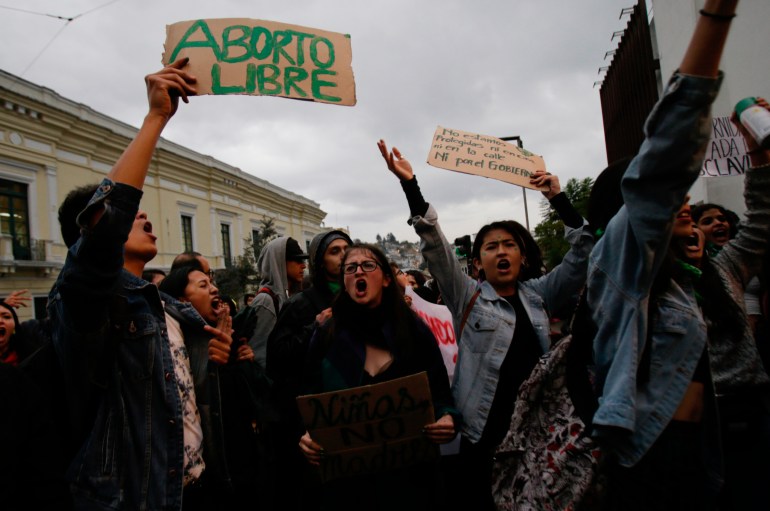
In the meantime in Ecuador, people like Dr Rita Bedoya, the sub-secretary of health promotion, gender and equality in the health ministry, are committed to ensuring that women can access abortions that are legal now. Part of her work is countering the misinformation and fear that medical professionals still have about being prosecuted for abortions that are legal.
Dr Bedoya, a formal rural doctor, recalled past ministry edicts that instructed doctors to report women to the police, something she said led doctors to act “like detectives” in the middle of an obstetric emergency. “They wanted to know if it was something that was provoked rather than what the patient’s vitals were at,” she told Al Jazeera.
The situation has changed, she said, and it is up to the ministry to make that clear. It has intervened in a number of cases since the April ruling to ensure rape survivors could get an abortion, she said.
“The court decision was a big leap,” she said. “We are working hard to broadcast this achievement, which feminists fought for in the streets.” Still, Dr Bedoya said it will not be easy in a medical field full of “pro-life” (anti-abortion rights) adherents. “People do not understand that they work for a secular state and confuse things and believe that their faith, their religion, may be above the laws.”
Women’s rights lawyer Annabell Guerrero Pita agreed that the country is living an important moment. She believed it will require “vigilence” on the part of feminist campaigners like herself to ensure the spirit of the court decision is not diluted in the legislative process.
“Many members of the assembly, with their comments, make it clear that they don’t want to comply with the court’s ruling,” she said. “Civil society is going to have to keep a close watch on what the assembly does.”